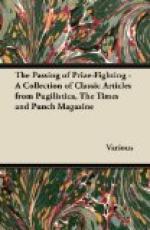THE DRAMA
ROMEO AND JULIET.
Italy! land of love and maccaroni, of pathos and puppets—tomb of Romeo and Juliet—birth-place of Punch and Judy—region of romance—country of the concentrated essences of all these;—carnivals—I, PUNCH, the first and last, the alpha and omega of fun, adore thee! From the moment when I was cast upon thy shores, like Venus, out of the sea, to this sad day, when I am forced to descend from my own stage to mere criticism; have I preserved every token that would endear my memory to thee! My nose is still Roman, my mouth-organ plays the “genteelest of” Italian “tunes”—my scenes represent the choicest of Italian villas—in “choice Italian” doth my devil swear—to wit, “shal-la-bella!”
Longing to be still more reminded of thee, dear Italy, I threw a large cloak over my hunch, and a huge pair of spectacles over my nose, and ensconced myself in a box at the Haymarket Theatre, to witness the fourth appearance of my rival puppet, Charles Kean, in Romeo. He is an actor! What a deep voice—what an interesting lisp—what a charming whine—what a vigorous stamp, he hath! How hard he strikes his forehead when he is going into a rage—how flat he falls upon the ground when he is going to die! And then, when he has killed Tybalt, what an attitude he strikes, what an appalling grin he indulges his gaping admirers withal!
This is real acting that one pays one’s money to see, and not such an unblushing imposition as Miss Tree practises upon us. Do we go to the play to see nature? of course not: we only desire to see the actors playing at being natural, like Mr. Gallot, Mr. Howe, Mr. Worral, or Mr. Kean, and other actors. This system of being too natural will, in the end, be the ruin of the drama. It has already driven me from the Stage, and will, I fear, serve the great performers I nave named above in the same manner. But the Haymarket Juliet overdoes it; she is more natural than nature, for she makes one or two improbabilities in the plot of the play seem like every-day matters of fact. Whether she falls madly in love at the first glance, agrees to be married the next afternoon, takes a sleeping draught, throws herself lifeless upon the bed, or wakes in the tomb to behold her poisoned lover, still in all these situations she behaves like a sensible, high-minded girl, that takes such circumstances, and makes them appear to the audience—quite as a matter of course! What let me ask, was the use of the author—whose name, I believe, was Shakspere—purposely contriving these improbabilities, if the actors do not make the most of them? I do hope Miss Tree will no longer impose upon the public by pretending to act Juliet. Let her try some of the characters in Bulwer’s plays, which want all her help to make them resemble women of any nation, kindred, or country.




